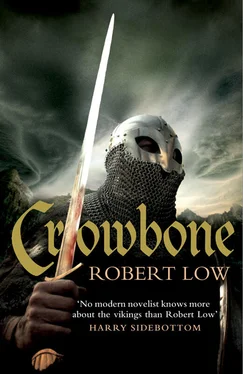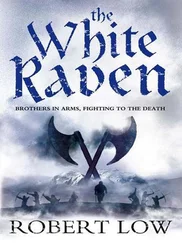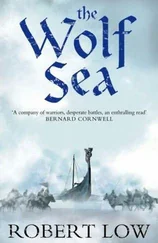Robert Low - Crowbone
Здесь есть возможность читать онлайн «Robert Low - Crowbone» — ознакомительный отрывок электронной книги совершенно бесплатно, а после прочтения отрывка купить полную версию. В некоторых случаях можно слушать аудио, скачать через торрент в формате fb2 и присутствует краткое содержание. Жанр: Исторические приключения, на английском языке. Описание произведения, (предисловие) а так же отзывы посетителей доступны на портале библиотеки ЛибКат.
- Название:Crowbone
- Автор:
- Жанр:
- Год:неизвестен
- ISBN:нет данных
- Рейтинг книги:4 / 5. Голосов: 1
-
Избранное:Добавить в избранное
- Отзывы:
-
Ваша оценка:
- 80
- 1
- 2
- 3
- 4
- 5
Crowbone: краткое содержание, описание и аннотация
Предлагаем к чтению аннотацию, описание, краткое содержание или предисловие (зависит от того, что написал сам автор книги «Crowbone»). Если вы не нашли необходимую информацию о книге — напишите в комментариях, мы постараемся отыскать её.
Crowbone — читать онлайн ознакомительный отрывок
Ниже представлен текст книги, разбитый по страницам. Система сохранения места последней прочитанной страницы, позволяет с удобством читать онлайн бесплатно книгу «Crowbone», без необходимости каждый раз заново искать на чём Вы остановились. Поставьте закладку, и сможете в любой момент перейти на страницу, на которой закончили чтение.
Интервал:
Закладка:
There was a way, he thought, for God’s judgement to be delivered, for the return of what had been lost, for the punishment of all those who had thwarted His purpose. Now even the three gold coins, given to him by the lord of Kiev years since and never spent, revealed their purpose, and he glanced once towards the stone they were hidden beneath. A good hefty stone, that, and it fitted easily into the palm.
By the time the old monk coughed his blood-misted last at dawn, Martin had worked out the how of it.
Hammaburg, some months later …
Folk said it was a city to make you gasp, hazed with smoke and sprawling with hundreds of hovs lining the muddy banks and spilling backwards into the land. There were ships by the long hundred lying at wharfs, moored by pilings, or drawn up on the banks and crawling with men, like ants on dead fish.
There were warehouses, carts, packhorses and folk who all seemed to shout to be heard above the din of metalsmith hammers, shrieking axles and fishwives who sounded as like the quarrelling gulls as to be sisters.
Above all loomed the great timber bell tower of the Christ church, Hammaburg’s pride. In it sat a chief Christ priest called a bishop, who was almost as important as the Christ priest’s headman, the Pope, Crowbone had heard.
Cloaked in the arrogance of a far-traveller with barely seventeen summers on him, Crowbone was as indifferent to Hammaburg as the few men with him were impressed; he had seen the Great City called Constantinople, which the folk here named Miklagard and spoke of in the hushed way you did with places that were legend. But Crowbone had walked there, strolled the flower-decked terraces in the dreaming, windless heat of afternoon, where the cool of fountains was a gift from Aegir, lord of the deep waters.
He had swaggered in the surrounds of the Hagia Sophia, that great skald-verse of stone which made Hammaburg’s cathedral no more than a timber boathouse. There had been round, grey stones paving the streets all round the Hagia, Crowbone recalled, with coloured pebbles between them and doves who were too lazy to fly, waddling out from under your feet.
Here in Hammaburg were brown-robed priests banging bells and chanting, for they were hot for the cold White Christ here — so much so that the Danes had grown sick of Bishop Ansgar, Apostle of the North, burning the place out from underneath him before they sailed up the river. That was at least five score years ago, so that scarce a trace of the violence remained — and Crowbone had heard that Hammaburg priests still went out to folk in the north, relentless as downhill boulders.
Crowbone was unmoved by the fervour of these shaven monks for he knew that, if you wanted to feel the power of the White Christ, then Miklagard, the Navel of The World, was the place for it. The spade-bearded priests of the Great City perched on walls and corners, even on the tops of columns, shouting about faith and arguing with each other; everyone, it seemed to Crowbone, was a priest in Miklagard. There, temples could be domed with gold, yet were sometimes no more than white walls and a rough roof with a cross.
In Miklagard it was impossible to buy bread without getting a babble about the nature of their god from the baker. Even whores would discuss how many Christ-Valkeyrii might exist in the same space while pulling their shifts up. Crowbone had discovered whores in the Great City.
Hammaburg’s whores thought only of money. Here the air was thick with haar, like wet silk, and the Christ-followers sweated and knelt and groaned in fearful appeasement, for the earth had shifted and, according to some Englisc monks, a fire-dragon had moved over their land, a sure sign that the world would end as some old seer had foretold, a thousand years after the birth of their Tortured God. Time, it seemed, was running out.
Crowbone’s men laughed at that, being good Slav Rus most of them and eaters of horse, which made them heathen in the eyes of Good Christ-followers. If it was Rokkr, the Twilight, they all knew none of the Christ bells and chants would make it stop, for gods had no control over the Doom of all Powers and were wyrded to die with everyone else.
Harek, who was by-named Gjallandi, added that no amount of begging words would stop Loki squirming the earth into folds and yelling for his wife to hurry up and bring back the basin that stopped the World Serpent venom dripping on his face. He said this loudly and often, as befits a skald by-named Boomer, so that folk sighed when he opened his mouth.
Even though the men from the north knew the true cause of events, such Loki earth-folding still raised the hairs on their arms. Perhaps the Doom of all Powers was falling on them all.
Crowbone, for his part, thought the arrogance of these Christ-followers was jaw-dropping. They actually believed that their god-son’s birth heralded the last thousand years of the world and that everyone’s time was almost up. Twenty years left, according to their tallying; good Christ children born now would be young men when their own parents rose out of their dead-mounds and everyone waited to be judged.
Crowbone was hunched moodily under such thoughts, for he knew the whims of gods only too well; his whole life was a knife-edge balance, where the stirred air from a whirring bird’s wing could topple him to doom or raise him to the throne he considered his right. Since Prince Vladimir of Kiev had turned his face from him, the prospect seemed more doom than throne.
‘You should not have axed his brother,’ Finn Horsehead growled when Crowbone spat out this gloomy observation shortly after Finn had shown up with Jarl Orm.
Crowbone looked at the man, all iron-grey and seamed like a bull walrus, and willed his scowl to sear a brand on Finn’s face. Instead, Finn looked back, eyes grey as a winter sea and slightly amused; Crowbone gave up, for this was Finn Horsehead, who feared nothing.
‘Yaropolk’s death was necessary,’ Crowbone muttered. ‘How can two princes rule one land? Odin’s bones — had we not just finished fighting the man to decide who ruled in Kiev and all the lands round it? Vladimir’s arse would never have stayed long on the throne if brother Yaropolk had remained alive.’
He knew, also, that Vladimir recognised the reality of it, too, for all his threats and haughtiness and posturing about the honour of princes and truces — Odin’s arse, this from a man who had just gained a wife by storming her father’s fortress and taking her by force. Yaropolk, the rival brother, had to die, otherwise he would always have been a threat, real or imagined and, one day, would have been tempted to try again.
None of which buttered up matters any with Vladmir, who had turned his back on his friend as a result.
‘There had been fighting, right enough,’ answered Orm quietly, moving from the shadows of the room. ‘But a truce and an agreement between brothers marked the end of it — at which point you axed Yaropolk between the eyes.’
But it was all posturing, Crowbone thought. Vladimir was pleased his brother was dead and would have contrived a way of doing it himself if Crowbone had not axed the problem away.
The real reason for the Prince of Kiev’s ire was that Crowbone’s name was hailed just as frequently as Vladimir’s now — and that equality could not be allowed to continue. It was just a move in the game of kings.
Crowbone fastened his scowl on the Bear-Slayer. A legend, this jarl of the Oathsworn — Crowbone was one of them and so Orm was his jarl, which fact he tried hard not to let scrape him. He owed Orm a great deal, not least his freedom from thralldom.
Eight years had passed since then. Now the boy Orm had rescued was a tall, lithe youth coming into the main of his years, with powerful shoulders, long tow-coloured braids heavy with silver rings and coins, and the beginning of a decent beard. Yet the odd eyes — one blue as old ice, the other nut-brown — were blazing and the lip still petulant as a bairn’s.
Читать дальшеИнтервал:
Закладка:
Похожие книги на «Crowbone»
Представляем Вашему вниманию похожие книги на «Crowbone» списком для выбора. Мы отобрали схожую по названию и смыслу литературу в надежде предоставить читателям больше вариантов отыскать новые, интересные, ещё непрочитанные произведения.
Обсуждение, отзывы о книге «Crowbone» и просто собственные мнения читателей. Оставьте ваши комментарии, напишите, что Вы думаете о произведении, его смысле или главных героях. Укажите что конкретно понравилось, а что нет, и почему Вы так считаете.












